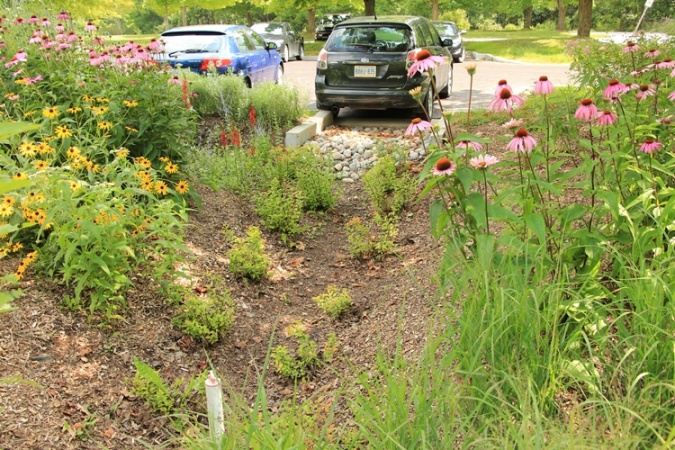Difference between revisions of "Swales"
Jenny Hill (talk | contribs) (Created page with "This article is about planted installations designed to capture surface runoff through an engineered soil with subterranean infrastructure. <br> For simpler, residential syst...") |
Jenny Hill (talk | contribs) |
||
| Line 97: | Line 97: | ||
===See Also=== | ===See Also=== | ||
<ul> | <ul> | ||
| − | <li>[[ | + | <li>[[Bioretention Cells]]</li> |
| − | <li>[[ | + | <li>[[Check Dams]]</li> |
</ul> | </ul> | ||
---- | ---- | ||
Revision as of 19:59, 21 June 2017
This article is about planted installations designed to capture surface runoff through an engineered soil with subterranean infrastructure.
For simpler, residential systems, see Rain Gardens.
For linear systems, which convey flow, but are otherwise similar see Bioswales.
Overview[edit]
Bioretention cells are the
Bioretention cells are an ideal technology for:
- People who want bioretention
The fundamental components of a bioretention cell are:
- Biomedia - an engineered soil mix
- Planting -
Additional components may include:
- Impermeable membrane to prevent infiltration to soils below
<panelSuccess>
</panelSuccess>
Planning Considerations[edit]
Planning Content
<panelSuccess>
</panelSuccess>
Design[edit]
Design Content
<panelSuccess>
</panelSuccess>
Performance[edit]
Performance Content
<panelSuccess>
</panelSuccess>
Incentives and Credits[edit]
In Ontario
City of Mississauga
The City of Mississauga has a stormwater management credit program which includes RWH as one of their recommended site strategies[1].
LEED BD + C v. 4
SITES v.2
See Also[edit]
External Links[edit]
| SEND US YOUR QUESTIONS & FEEDBACK ABOUT THIS PAGE |
